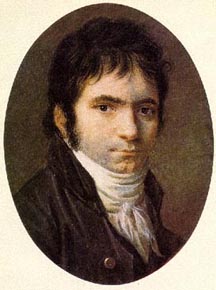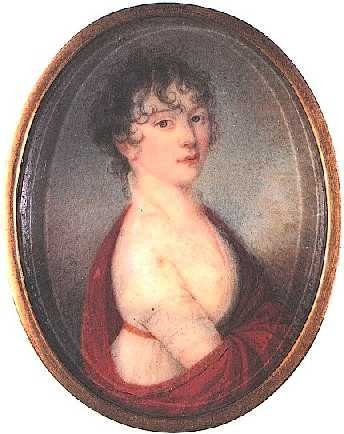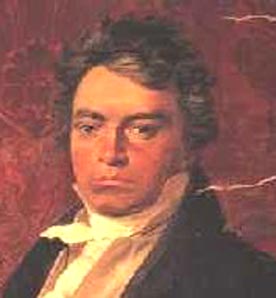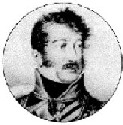 Beethoven around 1803 |
On that personal level, the years 1803 - 1804 saw Beethoven's outward ease in "letting go" of his infatuation with Giulietta Guicciardi, the cousin of the von Brunsvik sisters. In January 1804, she married Count von Gallenberg, a mediocre composer of ballet music. They moved to Italy. Beethoven's later personal secretary, Anton Schindler, preserved the conversation book of 1823 in which he discussed this subject with Beethoven in a sidewalk cafe.
 Giulietta Giucciardi |
Quite another matter was his following passionate yearning for Giulietta's cousin, Josephine von Brunsvik-Deym. We may recall that this young lady was married off to the 49-year-old Count von Deym in the summer of 1799. He passed away in 1803 and left Josephine behind with several children and pregnant with their last child. After her delivery, she went through a nervous breakdown. Beethoven's playing his music for her on his almost daily visits gave her a great deal of comfort so that she was able to slowly recuperate. Evident is that she certainly felt very grateful to him for his personal attention to her. The general impression that has been created by the review of the 1804 - 1805 correspondence between Beethoven and Josephine is that she may not have shared his "sensual" feelings. We do not know for certain, however, as to whether she had feelings for him or not and whether she followed her own dictates on the basis of her not sharing his feelings or the dictates of her family who discussed this issue in their correspondence with each other, such as in Therese von Brunsvik's letter to her younger sister Charlotte, "she must have the courage to say no". A draft letter of Josephine's that was found later lists some of the excuses she may have used on her own accord or been persuaded to use in evading Beethoven's courting her. She tried to express that she, as a widow and mother of several children, felt bound by a vow of chastity. {Cooper lists as main stumbling block in a possible union of Josephine von Brunsvik-Deym with Beethoven "the laws and customs of the time, which made it exceedingly difficult for a noblewoman to marry a commoner, especially if she had children. . . . Were she to marry Beethoven, she would lose her title and, far worse, the guardianship of her children, whose future would be unsure and unsafe, since Beethoven would hot have been granted the guadianship" (Cooper: 147, referring back to Tellenbach, 'Psychoanalsysis', 125).] At least outwardly, Beethoven appeared to have been willing to lay his passion for her to rest in the period between 1805 and 1808 while, in his last letter to her of 1808, he still maintained that he would always remain "ergeben" to her. Many translators bring this word over into English as "loyal", it may, however, also take on the meaning of "devoted".
The creative outburst of Beethoven's new, so-called heroic style of composition is evidenced in the Third Symphony, the so-called Eroica. [With respect to the widely cherished concept of an entirely "clean break" between Beethoven's first creative period and his second creative period, Barry Cooper cautions us that this might be "an oversimplification, and the idea is now frequently challenged. But it is undeniable that there was in a short space of time a dramatic change in his style, both in terms of new genres and new approaches to old ones, and the notion that this change markd in broad terms the beginning of the second great period of his oeuvre is likely to survive" (Cooper: 123).] We need not venture here into exploring in detail the presence or absence of his initial intentions to dedicate this symphony to Napoleon Bonaparte and his abandoning that concept in 1804 on hearing of Napoleon's self-coronation as Emperor in Rome. These years also saw the painful creation of his only opera, Fidelio, based on a French text by J.N. Bouilly.
It had its roots in the actual incident during the French Revolution of a wife's rescuing her husband from prison by infiltrating it in the disguise of a man. Beethoven's thirty-year fascination with the text of Schiller's Ode to Joy found its reflection in the lines of the opera's final chorus, "Wer ein holdes Weib errungen". The work was not very successfully staged in the half-empty theater before an audience of Beethoven friends and French military personnel. In an exhausting soiree at Prince Lichnowsky's residence, the revision of the work was initiated.
Spring 1806 saw the re-staging of Fidelio which was received somewhat more politely this time, but it would not yet capture the audience as it would later in yet another revision.
Beethoven's visit of the von Brunsviks at Martonvasar during the summer of 1806 may be as fictional as the evidently false diary notes with respect to Therese von Brunsvik's secret, platonic engagement that might have referred to this occasion.
Beethoven certainly visited Prince Lichnowsky at his estate in Troppau in Silesia during this late summer and fall. Lichnowsky reportedly asked Beethoven to play for the French military officials who were present. Beethoven refused and left "on the spot" and made his way back to Vienna by coach from the nearest town or village. [With respect to this, Cooper mentions that on his three-day journey back to Vienna, Beethoven encountered a severe storm in which "water penetrated his trunk, damaging the 'Appassionata' manuscript" (Cooper: 159).] Back in Vienna, he reportedly smashed Prince Lichnowsky's bust.
This incident, as characteristic as it may seem to us of Beethoven's passionate, violent outbursts, bears a more factual significance due to its financial consequence: His falling-out with this important patron may well have cut him off from the 600 florin a year annual allowance he used to receive from him and gave way to his insecure financial status in Vienna during the years 1806 - 1809, in spite of the many astounding works he put before the Viennese audience in his occasional academy concerts.
Another question the musical lay person and the Beethoven enthusiast might ask her or himself is what precisely happened to the continuity of the Schuppanzigh Quartet which used to practice and perform Haydn's and Beethoven's works at Prince Lichnowsky's residence. (We know that eventually, Prince Razumovsky's palace took over that function).
The years 1897 - 1808 saw the completion of the Fifth and Sixth Symphonies while Beethoven found yet another substitute family in the Erdödys. By this time, the young member of the Imperial family, Archduke Rudolph of Austria, was also Beethoven's pupil.
On March 27th, 1808, Beethoven was present at the final concert of the Liebhaber Concerts at which Haydn, turning 76 on March 31st, was honored. [As Solomon reports, "it is said that Beethoven knelt down before Haydn and fervently kissed the hands and forehead of his old teacher" (Solomon: 76).]
In late 1808/early 1809, in spite of his December 22nd, 1808 academy concert in the Theater an der Wien, which premiered his Fifth and Sixth Symphonies, Op. 67 and Op. 68 and the Choral Fantasy Op. 80, Beethoven considered to take Jerome Bonaparte's (whom his brother Napoleon Bonaparte had installed as King of Westphalia) offer as First Kapellmeister to Kassel for an annual salary of 600 ducats.
With Countess Erdödy's and Baron Ignaz von Gleichenstein's help, an annuity contract was negotiated for Beethoven with three of his most influential patrons, Archduke Rudolph, Prince Kinsky and Prince Lobkowitz, for 4,000 florins annually, in the spring of 1809.
|
|
|
An argument over a servant matter may have caused a temporary rift between Countess Erdödy and Beethoven. On account of the ensuing French occupation of Vienna, most of the nobility left the city.
Late spring and summer (Haydn died in May) saw Beethoven during the bombardment of Vienna by the French in the basement of his brother Caspar Carl's house when he covered his sensitive ears with pillows.
In 1809/1810, Beethoven joined a new circle of friends in the company of Baron von Gleichenstein, the Malfattis. Beethoven became infatuated with Therese von Malfatti, then eighteen years old, and even wrote to Wegeler and asked him to obtain for him his baptismal certificate. Stephan von Breuning advised Wegeler subsequently that Beethoven's marriage plans "fell through".
The years 1810 - 1812 are characterized by Beethoven's friendship with the Brentano family, his relationship with the Immortal Beloved of his famous July 1812 letter to her (Solomon research favors Antonie Brentano, Kaznelson's, Harry Goldschmidt's and Marie-Elisabeth Tellenbach's Josephine von Brunsvik, and Gail S. Altman's Countess Erdödy), his ultimately not taking up or not being able to take up her offer to live with him, his summer 1811 and 1812 stays in Teplitz and his meeting there of an interesting circle of artists which, in the second year, also included his encounter with Goethe, his retreat from the company of the Brentanos (with whom he vacationed in Karlsbad from late July to the beginning of September) to Teplitz in a state of renewed illness and the comforting company of the Berlin singer Amalie Sebald, his October 1812 interference in Linz into his pharmacist brother Johann's common-law living arrangements with his later wife Therese, and his return to Vienna in late fall, by which time his grieving process over the already pending(?) loss of the (in any event married) Immortal Beloved had him in its grip.
The year 1813 saw the continuation of Beethoven's grieving process over the loss of his Immortal Beloved. In this context, Solomon reports of Beethoven's increasing discussions between Baron Zmeskall and himself of either only Zmeskall's or their mutual frequenting, of the so-called Fortresses (which should be looked at very cautiously due to the fact that the proper translation of Beethoven's original letters carries with it the burden of Beethoven's unclear punctuation and, let us say his, at least 'unusual', use of German syntax), and his possible flight from the scene at Countess Erdödy's Jedlersee estate in the summer, in an attempt to end his life {for which Cooper finds no convincing base].
In the spring of 1813, Beethoven's brother Caspar Carl had his first serious bout with consumption. At its dramatic peak, Caspar Carl signed a declaration to the effect that he wished his older brother Ludwig to take over the guardianship of his son Carl in case of his death. Caspar Carl recovered once more. Beethoven's own pecuniary situation had worsened with the 1812 accidental death of Prince Kinsky, as well as due to the decline in the actual value of the Viennese currency and due to the "non-payment of the Kinsky and Lobkowitz subscription to his annuity" (Thayer: 552).
Whether or not, as reported in Thayer-Forbes, the Streichers found Beethoven in a very deplorable state in the summer of this year, whether or not Nanette Streicher took it upon herself to replenish Beethoven's wardrobe and to straighten out his household affairs, and whether or not the Streichers also urged Beethoven to set aside some money for the future, can neither be confirmed nor entirely ruled out. In the event that we can follow Thayer-Forbes in this respect, this would have allowed Beethoven to re-direct his energy towards improving his lot, and it would not come as a surprise that Beethoven should have let himself be "inspired" by the idea of the Regensburg musician and musical mechanic Johann Nepomuk Mälzel (he invented the musical metronome, developed a new and improved panharmonicum, and also built some very effective ear drums for Beethoven's use) to write the Battle Symphony in celebration of Wellington's June 21st, 1813 victory at Vittoria over Napoleon. The orchestra version was first performed at the December 8 and 12 University Hall benefit concerts for the Austrian and Bavarian veterans, at which time the Seventh Symphony was also first performed. The concerts were a resounding success and cemented Beethoven's popularity as a composer. For ardent Mozart lovers it may be of interest to note that Antonio Salieri was found supervising the drum section of the orchestra..... In 1814, Beethoven's and Mälzel's plans to take the Battle Symphony to England did not materialize. An argument arose as to the exact authorship of each part of this work which led to a law suit Beethoven commenced. It lasted for several years before a mutual settlement was reached.
Beethoven's new popularity led, however, to the performance of this long forgotten and recently more often played work at various benefit concerts and concerts for Beethoven's own benefit throughout 1814. His popularity also led the directors of the Imperial Opera to select Fidelio to be staged at performances for their own benefit. Beethoven and the theater poet Treitschke thoroughly revised the work. A new overture was also planned. Beethoven had begun to write this piece but could not finish it. On the morning of the premiere at which he was supposed to lead the final rehearsal, he had to be fetched from his home, where he was found sound asleep in bed, with the score to the unfinished overture strewn around on the bed and on the floor, and a casket of red wine with a biscuit in it on his bedside table.....
 Beethoven in 1814 |
The opera was performed sixteen times during this year and also contributed to Beethoven's success as a composer. Whatever financial gain Beethoven made during this year was set aside. He bought bank shares, the use of which he would not find himself to have permission due to certain upcoming circumstances.
The Congress of Vienna brought Europe's nobility to Vienna. They also "inspected" Beethoven at Count Razumovsky's palace, at which occasion Beethoven, as he later admitted, "held himself admirably" (Thayer). On December 30, the Razumovsky palace burned down. In early 1815, for the remainder of the Congress of Vienna, Beethoven mingled with the dignitaries at Archduke Rudolph's premises.
The year also saw the renewal of his friendship with the Erdödys in whose company he spent many hours at Jedlersee during the summer. Countess Erdödy left Jedlersee and Vienna in October, 1815. In his letter to her of October 19, Beethoven expressed his anxiety about her travel plans which she had formed by herself. He was afraid that she might experience ill health as she usually did when she traveled. Rather than carrying on in this vein, however, he tried to comfort her and himself with these words:
"We mortals with immortal minds are only born for sufferings and joys, and one could almost say that the most excellent receive joy through sufferings."
On November 15th, 1815, Beethoven's brother Caspar Carl died from his second bout with consumption. The deceased had appointed Beethoven, together with his widow Johanna, as co-guardians of his son Carl who was nine years old.


